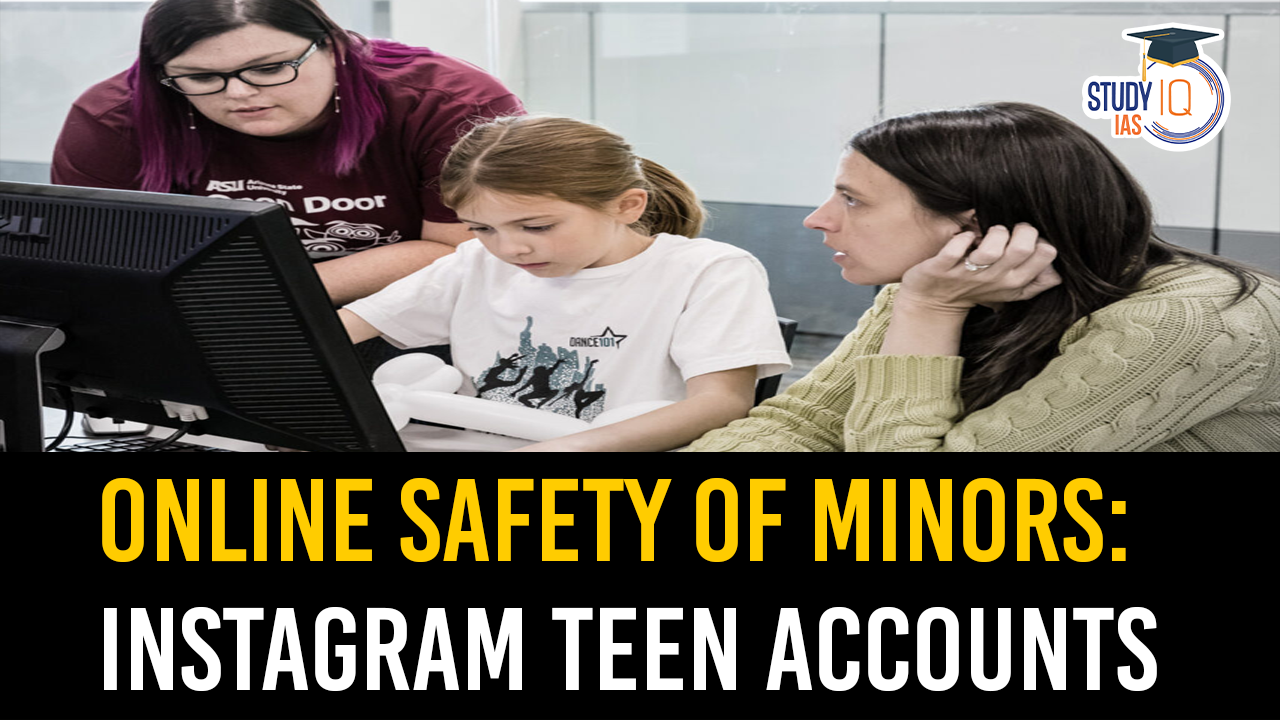Table of Contents
Context: In response to growing concerns about the safety of teenagers on social media, Meta has introduced Instagram Teen Accounts, designed specifically for users aged 13 to 18.
More in News
This initiative comes three years after whistleblower Frances Haugen highlighted Meta’s negligence in addressing Instagram’s harmful effects on teenage girls.
Key Features of Instagram Teen Accounts
- Private Accounts by Default: All accounts for users aged 13 to 17 will automatically be set to private, limiting visibility and interactions with strangers.
- Messaging Restrictions: Teens can only receive messages from people they follow or are connected to, reducing unwanted contact.
- Sensitive Content Controls: Teens will be placed under the strictest settings regarding sensitive content, limiting exposure to potentially harmful material.
- Interaction Limitations: Teens can only be tagged or mentioned by people they follow, and the platform’s anti-bullying features will filter out offensive comments and messages.
- Time Management Features: Notifications will remind teens to take breaks after 60 minutes of use each day, and a sleep mode will mute notifications between 10 PM and 7 AM.
- Parental Oversight: Parents can monitor their teen’s messaging activity over the past week without accessing the actual messages.
- They can set daily time limits and block access during specific hours.
- Age Verification Enhancements: Instagram is implementing new methods for verifying ages, including video selfies and mutual friend confirmations.
Context and Motivation Behind the Change
- Meta’s introduction of Teen Accounts comes amid significant reputational damage due to ongoing legal challenges from 41 states and the District of Columbia, as well as increasing calls for stricter regulations on social media platforms.
- Advocacy groups and governments are pushing for warning labels similar to those used for alcohol and tobacco products, reflecting widespread concern about the mental health impacts of social media on youth.
- The timing of this rollout suggests that Meta may be attempting to mitigate regulatory pressure while also attempting to improve its public image.
- Critics question whether these changes are genuinely aimed at enhancing user safety or primarily serve to deflect criticism and avoid legal repercussions.
Concerns Regarding Implementation
Despite these new features, several concerns persist:
- Parental Responsibility Shift: The reliance on parental controls shifts the burden of online safety from Meta to parents, which may not be feasible for all families, particularly those with limited digital literacy or time constraints.
- Cultural Disparities: The assumption that parents can effectively manage their children’s social media use may not hold in regions with varying levels of digital literacy, such as India, where many parents may struggle with technology themselves.
- Inequality in Online Safety: There is a risk that these measures could widen the gap between tech-savvy families and those less familiar with digital tools, reinforcing existing inequalities in online safety.
- Global Policy Disparities: Meta’s enforcement of content policies varies significantly between developed and developing markets, raising concerns about inconsistent protections for users globally.
- Business Interests vs. User Safety: While there are default limits on Teen accounts, these restrictions are advisory rather than enforced, allowing teens to bypass them easily unless monitored by parents.
Recommendations for Improvement
To enhance user safety effectively, Meta should consider:
- Designing systems with built-in safety features that do not rely heavily on parental oversight.
- Implementing platform-wide changes that prioritise positive content and ethical design frameworks.
- Encouraging meaningful connections among users rather than promoting impersonal interactions aimed solely at maximising engagement.


 National Technology Readiness Assessment...
National Technology Readiness Assessment...
 Justice Mission-2025: China’s Live-Fir...
Justice Mission-2025: China’s Live-Fir...
 Suryastra: First Made-in-India Long-Rang...
Suryastra: First Made-in-India Long-Rang...

























